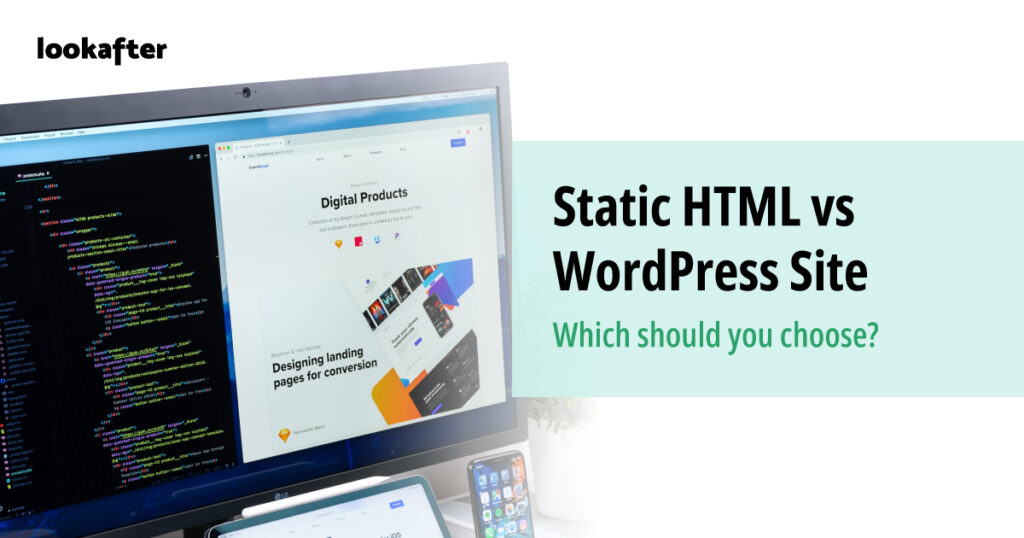Home > Empowering Tips > Static HTML vs WordPress Site: Which should you choose?

Choosing between Static HTML and WordPress depends on your specific needs and preferences. In this article, we will explore the characteristics, strengths, and considerations for each option to help you make the decision.
What is Static HTML Website
A Static HTML Website is a basic type of website that consists of plain HTML (Hypertext Markup Language), CSS (Cascading Style Sheets), and possibly some JavaScript files. Every page of the website is a separate HTML file, and each page is fixed, meaning its content remains the same until you manually edit the HTML code.
Pros:
- Simple and straightforward.
- Usually faster to load because there is no dynamic content generation.
- No need for a database or server-side processing.
- Lower initial development costs and minimal ongoing maintenance expenses.
Cons:
- Difficult to update content regularly since you need to manually edit HTML files.
- Limited interactivity and dynamic features.
- You need some coding knowledge to create and maintain the website.
Suitable For:
- Simple websites with fixed content, limited interactivity, and where regular content updates or a user-friendly content management system are not necessary.
What is WordPress
WordPress is a dynamic and interactive platform that allows you to create and manage websites more easily. It uses a content management system (CMS) and provides a user-friendly interface to manage website content, themes, and plugins.
Pros:
- User-friendly as you can create and update content easily without coding knowledge.
- Content is stored in a database, allowing you to manage and organize it efficiently.
- You can add various features and functionality through plugins and themes.
- Highly scalable for both small and large websites.
Cons:
- May require more resources compared to a static website, which might affect loading speed.
- Requires regular updates and security measures to protect against vulnerabilities.
- Higher initial development costs and ongoing expenses for hosting, themes, and plugins.
Suitable For:
- Content-rich websites, blogs, e-commerce platforms, and any site that requires frequent updates, interactivity, and a user-friendly content management system.
Choosing between Static HTML vs WordPress Site
Here are some guidelines to help you decide which option suits your needs:
- Technical Knowledge: If you’re comfortable with HTML, CSS, and coding, and prefer full control over your website, a static HTML website might be suitable.
- Ease of Use: If you are not familiar with coding or prefer an intuitive interface to update content easily, WordPress is the better choice.
- Website Complexity: For a simple and small website with fixed content, a static HTML site can suffice. If you need more dynamic features, regular content updates, or a blog section, WordPress is more suitable.
- Scalability: If you plan to expand your website with additional features and functionality over time, WordPress’s extensibility might be more beneficial.
- Budget: Static HTML websites may require less investment in hosting and maintenance, while WordPress sites might require more resources, including premium themes/plugins, and on-going maintenance fees.
- Security: WordPress needs regular updates and security measures to protect against potential vulnerabilities. If you’re concerned about security and don’t want to manage updates, a static website may be a safer option.
Summary
Here’s a brief summary to help you make the decision:
Choose Static HTML Website if:
- You need a simple and straightforward website with fixed content.
- Your site is a small website, landing page, or personal portfolio where content rarely changes.
- You or your team have some coding knowledge to create and maintain the website.
- Faster loading times are essential for your website.
- You have a limited budget for web development and hosting, as static websites generally have lower initial costs and maintenance expenses.
- You prioritize website security and want to minimize potential vulnerabilities by keeping the website static.
Choose WordPress Website If:
- You need an easy-to-use CMS that lets you (or your team) to create, edit, and organize content on your website efficiently.
- You or your team do not have extensive coding knowledge, as WordPress offers a user-friendly interface that simplifies content management and website customization.
- Your website requires dynamic features, interactivity, and the ability to add functionality easily through plugins, such as blogs, user comments, or e-commerce capabilities.
- Your website requires frequent updates, blog posts, news articles, or product additions, and you want to publish content quickly without manually editing HTML files.
- Your website may grow over time, and you need a platform that can easily accommodate additional pages, features, or changes in the future.
- You are willing to perform regular updates and security measures to keep your website secure and up-to-date with the latest versions of WordPress, themes, and plugins.